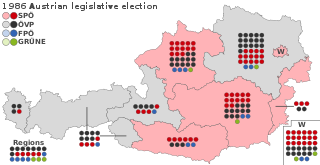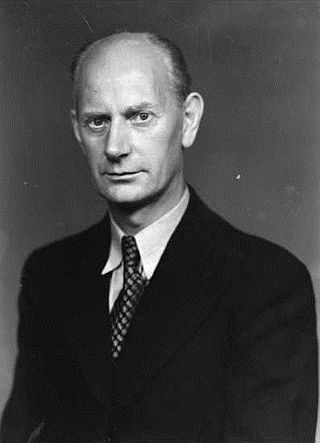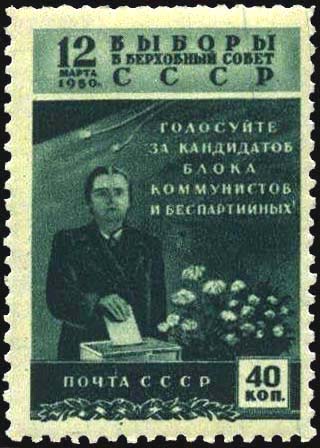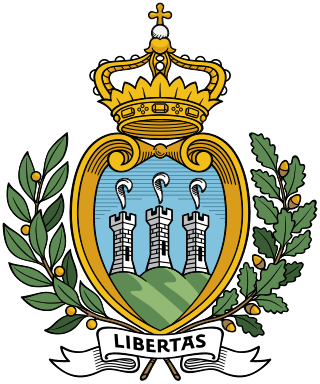
Early parliamentary elections were held in Austria on 23 November 1986. They were called by Chancellor Franz Vranitzky of the Socialist Party (SPÖ), as he was not prepared to continue the coalition government with new Freedom Party (FPÖ) leader Jörg Haider, who had ousted Norbert Steger at the party convention.

Parliamentary elections were held in Austria on 10 May 1959. Although the Socialist Party received the most votes, the Austrian People's Party retained a bare one-seat plurality. The Communist Party of Austria lost its remaining three seats and has not returned to the National Council since. Voter turnout was 94%. The grand coalition that had governed the country since 1945 remained in office, with People's Party leader Julius Raab as Chancellor and Socialist leader Bruno Pittermann as Vice-Chancellor.

Federal elections were held in Germany on 28 October 1884. The Centre Party remained the largest party in the Reichstag, with 99 of the 397 seats. Voter turnout was 60.5%.

Parliamentary elections were held in Norway on 12 October 1953. The result was a victory for the Labour Party, which won 77 of the 150 seats in the Storting.

Federal elections were held in Germany on 25 January 1907. Despite the Social Democratic Party (SPD) receiving a clear plurality of votes, they were hampered by the unequal constituency sizes that favoured rural seats. As a result, the Centre Party remained the largest party in the Reichstag after winning 101 of the 397 seats, whilst the SPD won only 43. Voter turnout was 84.7%.
General elections were held in Luxembourg on 1 February 1959. The Christian Social People's Party remained the largest party, winning 21 of the 52 seats in the Chamber of Deputies.

Parliamentary elections were held in Russia on 12 December 1993. They were the first parliamentary elections in post-Soviet Russia and the only time to the Federation Council, with future members appointed by provincial legislatures and governors.
Early parliamentary elections were held in Iceland on 25 and 26 October 1959. Following the electoral reforms made after the June elections, the Independence Party won 16 of the 40 seats in the Lower House of the Althing.
Parliamentary elections were held in Iceland on 25 April 1987. The Independence Party remained the largest party in the Lower House of the Althing, winning 12 of the 42 seats.

General elections were held in Malta between 12 and 14 June 1971. The Malta Labour Party emerged as the largest party, winning 28 of the 55 seats.
Federal elections were held in Switzerland on 25 October 1959. The Social Democratic Party and the Free Democratic Party emerged as the largest parties in the National Council, each winning 51 of the 196 seats.
Parliamentary elections were held in Norway on 17 October 1927. The Labour Party emergeed as the largest party, winning 59 of the 150 seats in the Storting. However, the subsequent government was headed by Ivar Lykke of the Conservative Party.

Elections to the Supreme Soviet were held in the Soviet Union on 12 March 1950.
The Social-Political Group was a political faction in Switzerland.
Parliamentary elections were held in Hungary on 25 and 26 January 1920. However, they were only held in 164 districts. After the Treaty of Trianon was signed, the 44 districts previously occupied by Romania voted between 13 June and 5 July, whilst the 11 districts occupied by Serbia did not vote until 30 and 31 October 1921. The election was held with compulsory voting. In protest at this and other changes to the franchise that left 60% of the voting age population unable to vote, the Hungarian Social Democratic Party boycotted the elections, and called for its supporters to cast invalid votes, resulting in an unusually high number of blank or invalid votes – 12% in the January elections and over 20% in Budapest and other major cities.

General elections were held in Liechtenstein on 11 March 1918, with a second round on 18 March. They were the first elections held in the country contested by political parties, as the Christian-Social People's Party and Progressive Citizens' Party had been founded that year. The Progressive Citizens' Party emerged as the largest in the Landtag, winning seven of the 12 elected seats.

General elections were held in Portugal on 28 April 1918, following a coup by Sidónio Pais in December 1917. The elections were boycotted by the Democratic Party, the Evolutionist Party and the Republican Union, who had won over 90% of the seats in the 1915 elections.

General elections were held in San Marino on 13 September 1959. The Sammarinese Christian Democratic Party remained the largest party, winning 27 of the 60 seats in the Grand and General Council.
Federal elections were held in Switzerland on 29 October 1939. The Free Democratic Party emerged as the largest party in the National Council, winning 49 of the 187 seats. Due to the outbreak of World War II, there were no elections in nine of the 25 cantons; Appenzell Ausserrhoden, Lucerne, Neuchâtel, Schwyz, Solothurn, Ticino, Valais, Vaud and Zug. In what became known as "silent elections", a total of 55 candidates were elected unopposed.

The Liberal Party, also known as the Radoslavists was a political party in Bulgaria from 1887 until 1920.













